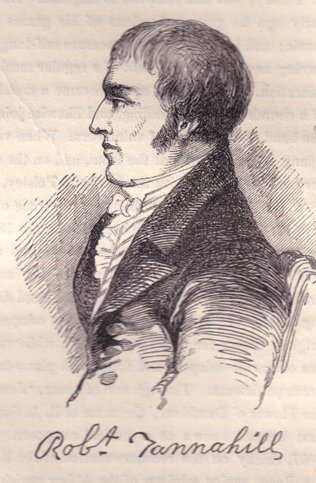|
TANNAHILL, ROBERT,
a popular song writer, was born in Paisley, June 3, 1774. His father was
a hand-loom weaver, and both his parents were respected for their
intelligence and worth. After receiving the most ordinary school
education, he was apprenticed to the weaving business. As he was in the
habit of composing verses while at work, he attached a sort of
writing-desk to his loom, by which he was enabled, in the midst of his
labours, to jot down the lines as they occurred to him. In this way some
of his best songs are said to have been composed. About the year 1800 he
went to England, accompanied by a younger brother, whom he left at
Preston, while he himself proceeded to Bolton, where he found constant
employment. Two years afterwards the brothers returned home, on
receiving intelligence of the last illness of their father; and on his
death they remained in Paisley. The poet having had the good fortune to
become acquainted with R.A. Smith, well known as a composer, the latter
set to music and arranged some of his finest songs. The first edition of
his poems appeared in 1807, and was very favourably received. The songs
attained an extensive popularity, and were sung from one end of Scotland
to the other; among them, ‘Jessie, the Flower o’Dumblane,’ ‘The Braes
o’Balquither,’ ‘Gloomy Winter’s now awa’,’ ‘The Lass o’Aranteenie,’
‘Loudon’s Bonnie Woods and Braes,’ and several others, continue to be
special favourites.
His acquaintance was now
courted by many who were his superiors in station; but his mind was
naturally prone to despondency, and, despairing of ever being able to
raise himself above the obscurity of his original condition, he soon
gave way to a confirmed melancholy. The refusal of Mr. Constable to
publish a second edition of his poems, added to the depression of his
spirits; and having resolved to destroy everything which he had written,
he burnt all his manuscripts, including many songs which had never been
printed. Amongst others who visited him about this time was the Ettrick
Shepherd. After a night spent in the most delightful communion of
sentiment, Hogg took his departure, Tannahill mournfully exclaiming,
“Farewell, we shall never meet again!” His portrait is subjoined.

[portrait of Robert Tannahill]
The day previous to his
death he went to Glasgow, where he displayed such unequivocal proofs of
mental derangement, that one of his friends considered it necessary to
accompany him back to Paisley. On being apprised of the state of his
mind, his brothers hastened to their mother’s house, where they found
that Robert had gone to bed, and was apparently asleep. About an hour
afterwards it was discovered that he had risen from his bed, and gone
out. Search was made in every direction, and next morning his body was
discovered in a pool in the vicinity of Paisley, where he had evidently
drowned himself. This melancholy event took place May 17, 1810, when he
had only reached his 36th year. In 1838 an enlarged edition of his poems
and songs, with memoirs of the author and of his friend, R.A. Smith, by
Mr. Philip A. Ramsay, was published at Glasgow.
Tannahill’s friend,
ROBERT ARCHIBALD SMITH, to whom Scottish melody is so much indebted, was
a native of England, but spent the greater part of his life in Scotland.
He was born at Reading, in Berkshire, November 16, 1780, being the son
of Robert Smith, a native of East Kilbride, near Glasgow, who had been a
silk-weaver in Paisley, but had removed to England. At an early age he
gave indications of his genius for music; and he was in a great measure
self-taught, having never had the benefit of a regular musical
education. As he grew up he became a member of a church choir in
Reading, and likewise joined the band of a regiment of volunteers. When
very young he was placed at the loom, and on the return of his father
with the family to Paisley, in 1800, he for some time followed the trade
of a weaver, but never liked the occupation. In 1802 he married, and
soon after he commenced the teaching of music. A congeniality of
sentiment brought him acquainted with Tannahill, and during the life of
the unfortunate bard, he composed original music for many of his songs,
while various others he adapted and fitted with piano-forte
accompaniments. Through one of these, ‘Jessie, the Flower o’Dumblane,’
the name of R.A. Smith first became known as a musical composer. In
1807, chiefly on the recommendation of the Rev. Dr. Boog, senior
minister of the Abbey parish of Paisley, he was appointed precentor of
that church, a situation which he filled with great credit for sixteen
years. In August 1823 he removed to Edinburgh, having been appointed to
conduct the music in St. George’s church of that city, under the
auspices of Dr. Andrew Thomson, the minister thereof, whose own musical
attainments were of a high order. Smith’s publications are of great
value. Among these are ‘Devotional Music, original and select,’
published in 1807, amounting to no less than twenty-one original pieces;
‘Anthems, in four vocal parts, with an Accompaniment for the Organ or
Piano-forte,’ 1819; and ‘Select Melodies,’ comprising every Scottish
melody worth preserving, with a great number of original pieces by the
editor, appeared in six volumes, at intervals, from 1821 to 1824. He
afterwards published a similar work, comprising the melodies of the
sister island, entitled ‘The Irish Minstrel.’ Besides these, he prepared
and arranged the following: -- ‘Sacred Music, for the use of St.
George’s Church, Edinburgh;’ ‘The Sacred Harmony of the Church of
Scotland;’ ‘Sacred Music, consisting of Tunes, Sanctuses, Doxologies,
Thanksgivings, &c., sung in St. George’s Church;’ and composed a number
of anthems for the anniversary of George Heriot’s day. His detached
pieces are very numerous. Smith died at Edinburgh, January 3, 1829,
universally lamented, leaving a widow and five children. |

